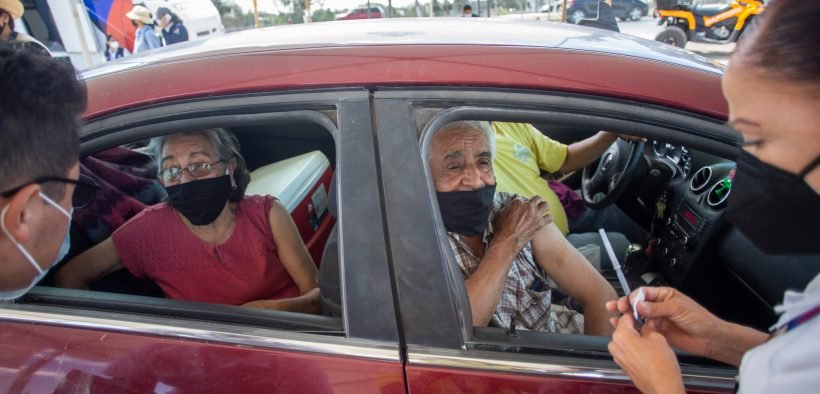‘The world’s haves and have-nots’: Global vaccine disparities on display at El Paso-Juárez border

(Editor's note: This story was produced as part of the Puente News Collaborative, a bi-national partnership of news organizations in Ciudad Juárez and El Paso.)
By Lauren Villagran/El Paso Times and Veronica Martinez/La Verdad
CIUDAD JUAREZ, Mexico -- Army Maj. Carlos Gutierrez popped into an El Paso airport gift shop on his way to catch a flight for his second trip to California since getting vaccinated against Covid-19 — the surest sign for him that, in the United States, the pandemic is finally receding.
“I had stayed away from traveling because of the high risk. But with the vaccines, things are opening up,” said Gutierrez, 43, traveling to visit his grandmother, who he hadn’t seen since the pandemic began.
A few miles south in Mexico, Juárez residents for the second weekend in a row were preparing for another “mega closure,” where shopping malls, big box stores and restaurants shut down to slow a surge in coronavirus cases.
The global disparities in vaccine access and distribution have grown increasingly evident at the U.S.-Mexico border, where anyone who wants a shot can get one at Walmart or a “pop-up” clinic in El Paso, while doctors and nurses at private hospitals in Juárez are still fighting for access to the vaccine.
The disparate narratives are creating headaches for regional public health authorities, whose vaccine inventory in the U.S. depends on local, state and federal government distribution, and in Mexico is supplied by the Ministry of Defense and administered by state health departments.
“A little river separates us,” said Dr. Manuel De La Rosa, vice president for outreach and community engagement at the Texas Tech Health Sciences Center in El Paso, and who has also served on cross-border health task forces. “We share the same disease but we don’t have the same access to medications or to the vaccine. I think we’re not going to reach herd immunity in the region until we get the entire (Paso del Norte) valley vaccinated.”
The principal applies globally: The longer the virus circulates, health experts say, the greater the likelihood that it will mutate and pose new risks to global health.
“We’re concerned about variants developing,” Lara Anton, spokesperson for the Texas Department of Health and Human Services, said. “Right now, the vaccines are very effective, but the longer the virus is circulating the longer it has to mutate into a variant that the vaccine isn’t effective against.”
Mexico has struggled to secure vaccines on the world market. Vaccine sharing between the United States and Mexico — or between Texas and Mexican border states — has been minimal. The administration of President Andrés Manuel López Obrador is increasingly relying on China and Russia to supply homegrown versions.
As of April 30, Mexico reported it has secured or was awaiting delivery of about 25 million vaccines, roughly enough to vaccinate a quarter of the country’s 93 million people over age 15.
In Juárez, the fourth wave of infections and weekend business closures weighed on residents and business owners tired of more than a year of periodic shutdowns, restrictions and elevated health risks.
Antony Shalhoub, 20, manages a family restaurant in Juárez with his mother and sister that depends heavily on weekend traffic. He said he didn’t think the pandemic would last as long as it has.
“I wish Mexico was taking the same measures that the United States is taking to get everyone vaccinated and that things could start to get reactivated,” he said. “It’s like, just when you think that all of this will be over, then suddenly there is another major closure. It hit us really hard.”
Mexico looks beyond its borders for vaccines
The daily count of new Covid-19 cases in El Paso has been declining since early January, when El Paso County was reporting more than 800 new infections a day. The new case count fell to 46 on May 5, a low in 2021.
El Paso health authorities say 64% of residents over age 16 have received at least one dose of the COVID-19 vaccine; 43% of the county population is fully vaccinated. Authorities have shifted from fretting about vaccine availability to grappling with a new problem: convincing hard-to-reach and hesitant populations to show up for a shot.
In Juárez, vaccine supplies can’t come fast enough. Vaccines have trickled up from Mexico City on a slow drip.
New cases of coronavirus spiked across Chihuahua during the last two weeks of April, prompting the state to order a near total shutdown of businesses on two consecutive weekends — a novel attempt to slow the spread without hurting economic activity Monday through Friday.
State health authorities reported 192 cases in Juárez in the week ending May 2, but that’s believed to be a significant understatement of the true spread. Public Covid-19 testing isn’t widely available in Juárez; tests at a private hospital can cost 2,500 pesos, or $120, and are beyond most residents’ reach.
The first doses of the vaccine available to the public arrived in April. An estimated 100,000 people over age 60 got a first shot of the AstraZeneca vaccine at mega sites in Juárez; Mexican authorities have declined to release the exact number of applied doses.
The United States supplied 2.7 million doses of the AstraZeneca vaccine to Mexico earlier this year — one of the brands not being deployed in the United States. (China has supplied Mexico with more than 8 million doses of two Chinese brands, CanSino and Sinovac.)
Ahead of a visit to the United States by Foreign Minister Marcelo Ebrard, deputy foreign minister for multilateral affairs Martha Delgado told news agencies last week that Mexico may propose prioritizing vaccination along its border with the United States.
There is no residency requirement to get vaccinated in Texas. But the restrictions on non-essential travel at ports of entry essentially prohibit Mexican nationals with a tourist visa from crossing, which means most Juárez residents can’t come to El Paso for a shot.
“We’re always concerned when you see cases on the rise anywhere and we want to make sure that Texans know that getting vaccinated is the best way to protect themselves from the virus,” Anton said.
A year on, no binational strategy
Elected officials in Texas say they recognize the imbalance and the risks posed to border communities.
U.S. Rep. Veronica Escobar, a Democrat from El Paso, has been calling for a coordinated, binational response to Covid-19 since early in the pandemic and has been frustrated by both the Trump and Biden administrations’ inaction on the issue of a cross-border strategy.
Despite numerous pleas to the White House — in phone calls with Anthony Fauci, chief medical adviser to the president, and letters to Jeffrey Zients, White House coronavirus response coordinator — a binational plan hasn’t emerged. Escobar has written Mexico’s López Obrador directly, asked Congress to include a binational strategy in its Covid-19 relief packages and held meetings with key stakeholders.
“The federal government urgently needs to develop a coordinated binational COVID-19 response with Mexico,” Escobar wrote in an April 22 follow-up letter to Zients, “one that ensures that any vaccines provided to Mexico are first used in their northern border communities tied to us through land ports of entry.”
She told the El Paso Times, “I was delighted that President Biden sent vaccines to Mexico, but there was no requirement to use those vaccines in places that were advantageous to us.”
U.S. Sens. John Cornyn and Ted Cruz, both Texas Republicans, have said they support the United States eventually sharing vaccines with countries that need them.
“Sen. Cruz wants to ensure America is at full capacity to administer vaccines stateside and if there is any excess manufacturing capacity then begin administering to other countries,” a Cruz spokesperson said in an emailed statement.
A spokesperson for Cornyn supplied a letter sent to Biden in which the senator asks the administration to support India and other hard-hit nations by providing medical supplies and surplus vaccinations. The letter didn’t mention Mexico.
The United States and Mexico belong to a global effort to create equity in vaccine distribution.
A consortium of 190 nations formed to combat inequalities in vaccine distribution, known as COVAX, aims to purchase mass amounts of vaccines and equitably distribute to countries to vaccinate at least 20% of their populations, especially health care workers and vulnerable groups.
World Health Organization Director-General Dr. Tedros Adhanom Ghebreyesus warned in January that nations “now face the real danger that even as vaccines bring hope to some, they become another brick in the wall of inequality between the world’s haves and have-nots.”
Dividing line between hope and frustration
At the El Paso airport, travelers in face masks bustled between check-in counters and milled about the baggage claim.
Herjid Kaur, 64, held onto her 3-year-old granddaughter’s stroller with her 7-year-old granddaughter at her side. She is vaccinated; so is her daughter-in-law. The family was headed for Chicago to see her son and she was “very excited,” she said.
“It’s the first time I have seen him in a year and a half,” she said.
In Juárez, residents coming off a weekend of business closures flocked to grocery stores.
Jenny Alvarez, 24, and Hugo Benavides, 37, loaded their car with plastic bags in the parking lot of a Smart supermarket on Monday evening, the day businesses reopened.
Benavides said most of his family lives in El Paso. Watching them post photos on Facebook getting their second shot has been frustrating, he said. He thinks his Covid-19 vaccination could still be a year away.
“It’s sad to see that they don’t see the magnitude of what we’re struggling with,” he said.


